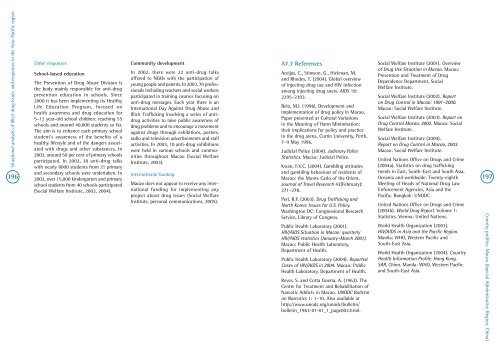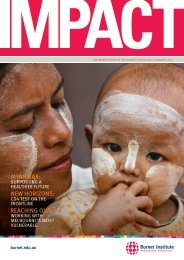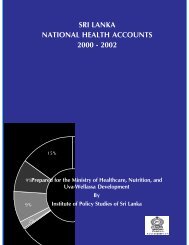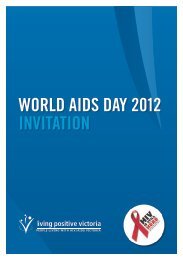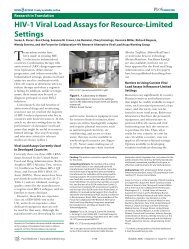Illicit Drug use in the Asia Pacific Region - Burnet Institute
Illicit Drug use in the Asia Pacific Region - Burnet Institute
Illicit Drug use in the Asia Pacific Region - Burnet Institute
Create successful ePaper yourself
Turn your PDF publications into a flip-book with our unique Google optimized e-Paper software.
Situational analysis of illicit drug issues and responses <strong>in</strong> <strong>the</strong> <strong>Asia</strong>–<strong>Pacific</strong> region<br />
196<br />
O<strong>the</strong>r responses<br />
School-based education<br />
The Prevention of <strong>Drug</strong> Ab<strong>use</strong> Division is<br />
<strong>the</strong> body ma<strong>in</strong>ly responsible for anti-drug<br />
prevention education <strong>in</strong> schools . S<strong>in</strong>ce<br />
2000 it has been implement<strong>in</strong>g its Healthy<br />
Life Education Program, foc<strong>use</strong>d on<br />
health awareness and drug education for<br />
5–12 year-old school children: reach<strong>in</strong>g 55<br />
schools and around 40,000 students so far .<br />
The aim is to enhance each primary school<br />
student’s awareness of <strong>the</strong> benefits of a<br />
healthy lifestyle and of <strong>the</strong> dangers associated<br />
with drugs and o<strong>the</strong>r substances . In<br />
2002, around 50 per cent of primary schools<br />
participated . In 2002, 30 anti-drug talks<br />
with nearly 8000 students from 21 primary<br />
and secondary schools were undertaken . In<br />
2003, over 15,000 k<strong>in</strong>dergarten and primary<br />
school students from 40 schools participated<br />
(Social Welfare <strong>Institute</strong>, 2003, 2004) .<br />
Community development<br />
In 2002, <strong>the</strong>re were 22 anti-drug talks<br />
offered to NGOs with <strong>the</strong> participation of<br />
young people and parents . In 2003, 70 professionals<br />
<strong>in</strong>clud<strong>in</strong>g teachers and social workers<br />
participated <strong>in</strong> tra<strong>in</strong><strong>in</strong>g courses focus<strong>in</strong>g on<br />
anti-drug messages . Each year <strong>the</strong>re is an<br />
International Day Aga<strong>in</strong>st <strong>Drug</strong> Ab<strong>use</strong> and<br />
<strong>Illicit</strong> Traffick<strong>in</strong>g <strong>in</strong>volv<strong>in</strong>g a series of antidrug<br />
activities to raise public awareness of<br />
drug problems and to encourage a movement<br />
aga<strong>in</strong>st drugs through exhibitions, posters,<br />
radio and television advertisements and stall<br />
activities . In 2003, 10 anti-drug exhibitions<br />
were held <strong>in</strong> various schools and communities<br />
throughout Macao (Social Welfare<br />
<strong>Institute</strong>, 2003) .<br />
International fund<strong>in</strong>g<br />
Macao does not appear to receive any <strong>in</strong>ternational<br />
fund<strong>in</strong>g for implement<strong>in</strong>g any<br />
project about drug issues (Social Welfare<br />
<strong>Institute</strong>, personal communications, 2005) .<br />
A7 .7 References<br />
Aceijas, C ., Stimson, G ., Hickman, M .<br />
and Rhodes, T . (2004) . Global overview<br />
of <strong>in</strong>ject<strong>in</strong>g drug <strong>use</strong> and HIV <strong>in</strong>fection<br />
among <strong>in</strong>ject<strong>in</strong>g drug <strong>use</strong>rs . AIDS 18:<br />
2295–2303 .<br />
Belo, M .I . (1996) . Development and<br />
implementation of drug policy <strong>in</strong> Macao .<br />
Paper presented at Cultural Variations<br />
<strong>in</strong> <strong>the</strong> Mean<strong>in</strong>g of Harm M<strong>in</strong>imisation:<br />
<strong>the</strong>ir implications for policy and practice<br />
<strong>in</strong> <strong>the</strong> drug arena, Curt<strong>in</strong> University, Perth,<br />
7–9 May 1996 .<br />
Judicial Police (2004) . Judiciary Police<br />
Statistics . Macao: Judicial Police .<br />
Kwan, F .V .C . (2004) . Gambl<strong>in</strong>g attitudes<br />
and gambl<strong>in</strong>g behaviour of residents of<br />
Macao: <strong>the</strong> Monte Carlo of <strong>the</strong> Orient .<br />
Journal of Travel Research 42(February):<br />
271–278 .<br />
Perl, R .F . (2003) . <strong>Drug</strong> Traffick<strong>in</strong>g and<br />
North Korea: Issues for U.S. Policy .<br />
Wash<strong>in</strong>gton DC: Congressional Research<br />
Service, Library of Congress .<br />
Public Health Laboratory (2001) .<br />
HIV/AIDS Situation <strong>in</strong> Macao: quarterly<br />
HIV/AIDS statistics (January–March 2001) .<br />
Macao: Public Health Laboratory,<br />
Department of Health .<br />
Public Health Laboratory (2004) . Reported<br />
Cases of HIV/AIDS <strong>in</strong> 2004 . Macao: Public<br />
Health Laboratory, Department of Health .<br />
Reves, S . and Cotta Guerra, A . (1963) . The<br />
Centre for Treatment and Rehabilitation of<br />
Narcotic Addicts <strong>in</strong> Macao . UNODC Bullet<strong>in</strong><br />
on Narcotics 1: 1–10 . Also available at<br />
http://www .unodc .org/unodc/bullet<strong>in</strong>/<br />
bullet<strong>in</strong>_1963-01-01_1_page002 .html .<br />
Social Welfare <strong>Institute</strong> (2001) . Overview<br />
of <strong>Drug</strong> Use Situation <strong>in</strong> Macao . Macao:<br />
Prevention and Treatment of <strong>Drug</strong><br />
Dependence Department, Social<br />
Welfare <strong>Institute</strong> .<br />
Social Welfare <strong>Institute</strong> (2002) . Report<br />
on <strong>Drug</strong> Control <strong>in</strong> Macao: 1991–2000 .<br />
Macao: Social Welfare <strong>Institute</strong> .<br />
Social Welfare <strong>Institute</strong> (2003) . Report on<br />
<strong>Drug</strong> Control Macao, 2002 . Macao: Social<br />
Welfare <strong>Institute</strong> .<br />
Social Welfare <strong>Institute</strong> (2004) .<br />
Report on <strong>Drug</strong> Control <strong>in</strong> Macao, 2003 .<br />
Macao: Social Welfare <strong>Institute</strong> .<br />
United Nations Office on <strong>Drug</strong>s and Crime<br />
(2004a) . Statistics on drug traffick<strong>in</strong>g<br />
trends <strong>in</strong> East, South-East and South <strong>Asia</strong>,<br />
Oceania and worldwide: Twenty-eighth<br />
Meet<strong>in</strong>g of Heads of National <strong>Drug</strong> Law<br />
Enforcement Agencies, <strong>Asia</strong> and <strong>the</strong><br />
<strong>Pacific</strong> . Bangkok: UNODC .<br />
United Nations Office on <strong>Drug</strong>s and Crime<br />
(2004b) . World <strong>Drug</strong> Report. Volume 1:<br />
Statistics . Vienna: United Nations .<br />
World Health Organization (2003) .<br />
HIV/AIDS <strong>in</strong> <strong>Asia</strong> and <strong>the</strong> <strong>Pacific</strong> <strong>Region</strong> .<br />
Manila: WHO, Western <strong>Pacific</strong> and<br />
South-East <strong>Asia</strong> .<br />
World Health Organization (2004) . Country<br />
Health Information Profile: Hong Kong,<br />
SAR, Ch<strong>in</strong>a . Manila: WHO, Western <strong>Pacific</strong><br />
and South-East <strong>Asia</strong> .<br />
197<br />
Country profiles: Macao (Special Adm<strong>in</strong>istrative <strong>Region</strong>, Ch<strong>in</strong>a)


